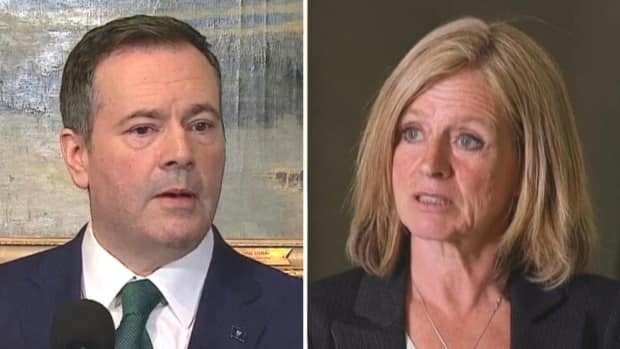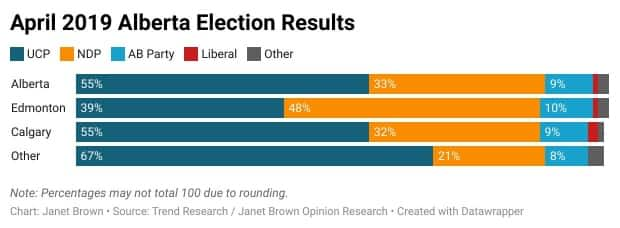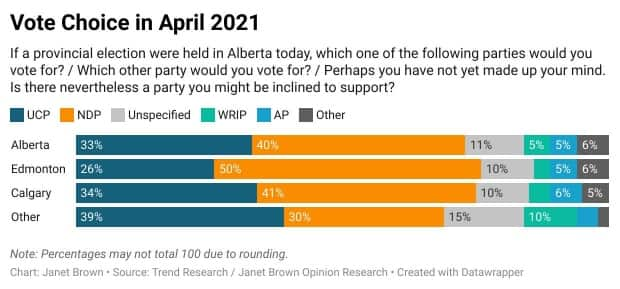Alberta NDP would likely form majority if election held today, new poll suggests

EDITOR'S NOTE: CBC News and The Road Ahead commissioned this public opinion research in March, just as the third wave of COVID-19 cases was building in Alberta.
As with all polls, this one is a snapshot in time.
This analysis is one in a series of articles to come out of this research. More stories are to follow.

If an election in Alberta were held today, the NDP would likely win a majority, as support for the governing United Conservative Party plummets, according to a new poll commissioned by CBC News.
The poll, conducted in March and April, suggests all parts of the province are souring on the current government, with declines in Calgary, smaller municipalities and rural areas. But it also shows a fractured electorate, with a sizable chunk of voters looking for a third option.
It also shows Premier Jason Kenney's approval falling precipitously since he was first elected.
The findings are more bad news for a party that has struggled to overcome persistent economic challenges and the pandemic, and which is now facing a caucus revolt over public health restrictions. They could indicate a turbulent near future as Alberta navigates a socio-economic and political crossroads.
The numbers
Across the province, compared to the 2019 election that brought the newly formed UCP to power, support for the governing party has cratered from 55 per cent of voters to 33 per cent of respondents in this month's poll.
The poll, conducted by Janet Brown Opinion Research on behalf of CBC News, suggests declines in support across all regions, with the NDP surging ahead of the UCP in the key battleground of Calgary and the UCP plummeting in more rural parts of the province.

In Calgary, 41 per cent of respondents now say they would vote for the NDP, compared to 34 per cent for the UCP.
That's a considerable shift from the 2019 election, when 55 per cent voted for the UCP and 32 per cent for the NDP.
Outside the cities of Calgary and Edmonton, support for the government has sunk 28 points — from 67 per cent voter support to 39 per cent of respondents saying they'd vote UCP now.

Nestled among the numbers, however, is about 25 per cent of respondents who say they're not interested in voting for either of the leading parties.
Fully 11 per cent of respondents said they don't know who to vote for, leaving the door open for a third party.
Edmonton remains an NDP bastion with 50 per cent support, compared to 26 per cent support for the UCP, according to the poll.
"What's interesting about this poll, because there's been other polls that have shown the NDP moving ahead on a provincial level, but that's really only been because they've had such a tremendous lead in Edmonton," said pollster Janet Brown.
"But now that they're leading in both Edmonton and Calgary, that sets them up for winning government."
But the findings aren't just grim news for the governing party. The poll also suggests a lack of faith in Kenney's leadership.
The leaders
Prior to being elected, Kenney was riding high, with a previous Janet Brown poll showing 36 per cent of respondents were highly impressed with the new UCP leader in March 2018.
That honeymoon is truly over.

In the latest poll, only 16 per cent of respondents say they're highly impressed with Kenney, while 53 per cent are not impressed.
NDP Leader Rachel Notley's numbers have remained stable, with 34 per cent of respondents saying they're highly impressed with her and 36 per cent saying they're not.

So how does that play out in the rough and tumble world of Alberta politics?
What it means
Melanee Thomas, a professor of political science at the University of Calgary, said she looks at the results and sees instability for the UCP and stability for the NDP.
"What's interesting with the NDP is that they've never dropped below a certain level, like in the low- to mid-30s. That seems to be their floor and all they need to do is swing up to like 41, 43 [per cent]," she said.
"I think the same thing with the UCP. I think that's a credible way to think about it, where now they're probably finding their floor. And so now the debate is about who gets that swing?"
Brown says the strength of the NDP isn't necessarily as secure as the numbers suggest.
"They've pulled ahead, mainly because the UCP has been falling behind," she said.
Duane Bratt, a political scientist at Mount Royal University in Calgary, points out that much of the support that has bled from the UCP has not gone toward the NDP.
Across the province, the 22-point plunge for the UCP resulted in a seven-point increase for the NDP. Outside Calgary and Edmonton, a 28-point drop saw a nine-point rise for the NDP.
"That tells me that there's a ceiling, and that Rachel Notley and the NDP have hit their ceiling," he said.
"You can't win in a two-party system with 40 per cent. You can win in a multi-party system, but you can't win in a two-party system."
It remains to be seen if the current turmoil in the UCP, and that significant group of unsatisfied voters, will lead to a more scattered political landscape.
2 years to go
It is still two years before the next Alberta election, with untold challenges and changes that could take place in the interim. The poll and its findings are a snapshot in time.
Bratt says, despite all the controversies and challenges currently facing the UCP, there is still the chance for a win in 2023 — even with an embattled Kenney at the helm.
"As bad as it may appear at first blush, when I start to think about it a bit more — what is life like in two years' time? What is life like post-vaccination? What is life like when the economy starts to come back?" he said.
CBC News' random survey of 1,200 Albertans was conducted between March 15 to April 10, 2021 by Edmonton-based Trend Research under the direction of Janet Brown Opinion Research (http://planetjanet.ca/special-projects/). The sample is representative along regional, age, and gender factors. The margin of error is +/-2.8 percentage points, 19 times out of 20. For subsets, the margin of error is larger. The survey used a hybrid methodology that involved contacting survey respondents by telephone and giving them the option of completing the survey at that time, at another more convenient time, or receiving an email link and completing the survey online.

 Yahoo Movies
Yahoo Movies 